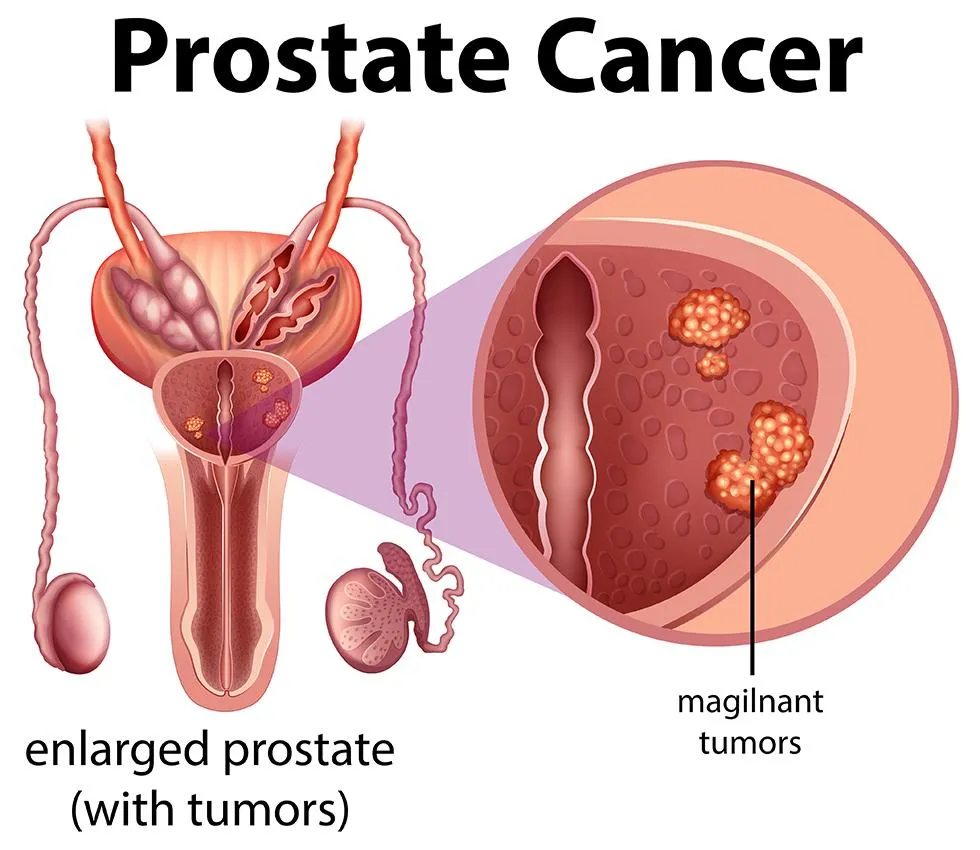Prostate Cancer Treatment
Prostate Cancer services offered in Milton Keynes and Oxford

Prostate Cancer
Prostate cancer is one of the most common cancers among men, but with early detection and expert care, the prognosis can be significantly improved. Mr. Angus Campbell specializes in the diagnosis and treatment of prostate cancer, offering comprehensive care in Oxford and Milton Keynes. Schedule a consultation today for a thorough evaluation and personalized treatment plan.
What is Prostate Cancer?
Prostate cancer occurs when cells in the prostate gland grow uncontrollably. It is often detected early through screening methods like PSA tests and digital rectal exams. Early-stage prostate cancer may not cause symptoms, but advanced stages can lead to urinary issues, blood in the urine, or discomfort in the pelvic area.
What symptoms might Prostate Cancer cause?
Prostate cancer often develops slowly, and in its early stages, there may be no symptoms at all. However, as the condition progresses, you may experience:
Difficulty urinating or a weak urine stream: You may find it hard to start or maintain a steady stream of urine.
Blood in the urine or semen: This can be an alarming but important symptom that should be checked immediately.
Pelvic discomfort or pain: A dull ache or pain in the pelvic area can indicate prostate issues.
Erectile dysfunction: Difficulty achieving or maintaining an erection may be a symptom of prostate cancer.
Frequent urination, especially at night: You may feel the urge to urinate more often, disrupting your sleep.
If you notice any of these symptoms, it’s crucial to see a doctor as soon as possible. Early detection is key to successful treatment.
How is Prostate Cancer Diagnosed?
Diagnosing prostate cancer involves a series of steps to confirm the presence of cancer and determine its stage. Here’s what the process typically includes:
PSA Blood Test:
This test measures the level of prostate-specific antigen (PSA) in your blood. Higher PSA levels may indicate prostate cancer or other prostate conditions.
Digital Rectal Examination (DRE):
During a DRE, the doctor feels the prostate through the rectum to check for abnormalities, such as lumps or hardness.
Additional Tests for Confirmation:
If cancer is suspected, further tests may be required:
MRI Scan: Provides detailed images of the prostate to identify suspicious areas.
Prostate Biopsy: A small sample of prostate tissue is taken and examined under a microscope to confirm cancer.
Prostate Mapping: This advanced technique provides a 3D view of the prostate, helping to pinpoint the location of cancerous cells.
Biopsy Techniques Performed by Mr. Campbell:
Mr. Campbell specializes in transperineal and transrectal prostate biopsies, which can be performed under general or local anesthesia. He also uses advanced techniques, such as:
MRI Targeting: Ensures precision by focusing on suspicious areas identified in imaging studies.
Saturation Biopsies: Collects more tissue samples for a thorough evaluation, improving diagnostic accuracy.
These diagnostic tools allow for a clear understanding of the cancer’s stage and grade, helping to guide treatment decisions.
What Treatments Are Available for Prostate Cancer?
Treatment for prostate cancer depends on the stage and grade of the disease, as well as your overall health and personal preferences. Each case is carefully reviewed by a multidisciplinary team (MDT) to ensure the best possible care. Common treatment options include:
Active Surveillance:
For low-risk prostate cancer that isn’t causing symptoms, regular monitoring may be recommended.
This approach involves periodic PSA tests, MRIs, and biopsies to track any changes in the cancer.
Radiation Therapy:
High-energy beams are directed at the prostate to destroy cancer cells.
This option is often used for localized cancer and can be combined with hormone therapy for advanced cases.
Radical Prostatectomy:
This surgery involves the complete removal of the prostate gland and, if necessary, nearby lymph nodes.
It is often recommended for cancers that haven’t spread beyond the prostate.
Hormone Therapy:
Also known as androgen deprivation therapy (ADT), this treatment reduces or blocks testosterone production, slowing the growth of cancer cells.
Hormone therapy is often used in combination with other treatments, like radiation therapy, for advanced stages of cancer.
Your treatment plan will be tailored to your unique situation, ensuring the most effective approach for managing or eliminating the cancer.
What to Expect After Treatment
Recovery and follow-up care are essential parts of the prostate cancer journey. Here’s what you can expect:
Monitoring for Recurrence:
Regular PSA tests will be scheduled to monitor for any signs of the cancer returning.
Imaging studies or biopsies may also be recommended if needed.
Managing Side Effects:
Treatments like surgery or radiation may cause temporary side effects, such as urinary incontinence, erectile dysfunction, or fatigue.
Mr. Campbell’s team provides guidance and support to manage these issues and help you return to your normal routine.
Lifestyle Changes for Recovery:
Staying physically active, eating a healthy diet, and managing stress can support your recovery and overall well-being.
Avoiding smoking and limiting alcohol intake may also reduce the risk of recurrence.
Schedule Your Consultation
If you’re concerned about prostate cancer or are experiencing symptoms, don’t wait. Early detection can make all the difference.
Contact Mr. Angus Campbell’s offices in Oxford or Milton Keynes to schedule a consultation. With advanced diagnostic techniques and a compassionate approach, Mr. Campbell will help you understand your condition and explore the best treatment options.
Book your appointment today to take the first step toward better prostate health.
STILL NOT SURE?
Frequently Asked Questions (FAQ) About Prostate Cancer
What causes prostate cancer?
Prostate cancer occurs when abnormal cells grow uncontrollably in the prostate gland. Risk factors include age, family history, genetics, and lifestyle choices.
Does a high PSA level always mean prostate cancer?
No, high PSA levels can also be caused by other conditions like an enlarged prostate (BPH) or inflammation (prostatitis). However, it’s important to investigate elevated PSA levels with further testing.
Is prostate cancer always aggressive?
Not always. Many cases of prostate cancer grow very slowly and may never cause serious problems. Low-risk cancers can often be monitored through active surveillance.
Will I need surgery for prostate cancer?
Surgery, such as radical prostatectomy, is only one of the treatment options. The decision depends on the cancer’s stage,grade, and your overall health. Some cases may be managed with non-surgical options like radiation or hormone therapy.
Can prostate cancer be cured?
Yes, many cases of prostate cancer are curable, especially when detected early. Treatment options like surgery or radiation therapy can effectively eliminate cancer in localized stages.
What are the side effects of treatment?
Side effects vary depending on the treatment. Common side effects include urinary incontinence, erectile dysfunction, and fatigue. Most side effects are temporary, and Mr. Campbell’s team will help you manage them effectively.
How soon can I return to normal activities after treatment?
This depends on the type of treatment you receive. Many patients resume light activities within a few weeks, while recovery from surgery may take longer. Your doctor will provide personalized guidance based on your treatment plan.
Is prostate cancer hereditary?
Yes, having a family history of prostate cancer or certain genetic mutations (like BRCA1 or BRCA2) can increase your risk. Discuss your family history with your doctor during your consultation.
Are there ways to reduce my risk of prostate cancer?
While some risk factors like age and genetics cannot be changed, maintaining a healthy lifestyle can help. Eating a balanced diet, exercising regularly, and avoiding smoking may reduce your risk.
How do I schedule a consultation?
You can contact Mr. Angus Campbell’s offices in Oxford or Milton Keynes to book an appointment. Early evaluation ensures timely diagnosis and treatment, giving you the best chance for a positive outcome.

Innovation
Fresh, creative treatment.

Integrity
Honesty and transparency.

Excellence
Top-notch services.
Copyright© Angus Campbell 2024. All Rights Reserved| Privacy Policy | Terms of Service | Website by The Higher League

